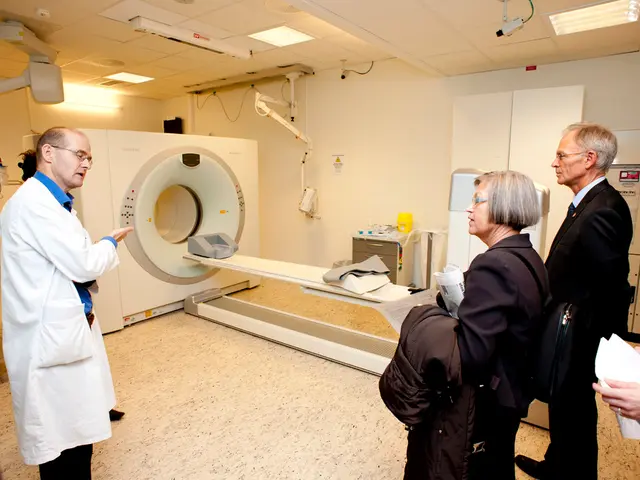Can regular cycling potentially lower the risk of Alzheimer's disease, a type of dementia?
Swinging the pedals away since its inception in the 19th century, cycling has become more than just a fun way to travel; it's also a shoe-in for health enthusiasts.
Studies have unearthed a plethora of health perks for those who opt for two wheels, such as improved heart health, stress reduction, and weight management. But what's particularly intriguing is the potential link to lowering the risk of dementia and Alzheimer's disease.
In a recent study, published in a well-known journal, researchers stumbled upon an exciting finding: those who use bicycling as their primary mode of transport may reap the benefits of a lower dementia risk compared to those who walk, drive, or hop on a bus.
Liangkai Chen, PhD, the lead author of the study, affirms, "Our key finding: Participants using cycling/mixed-cycling modes had a 19% lower all-cause dementia risk and 22% lower Alzheimer's disease risk versus non-active modes."
The researchers analyzed data from the U.K. Biobank, a massive collection of health information from nearly half a million individuals, with an average age of 57. They tracked participants for a median of 13 years, observing their main modes of travel and other sociodemographic and lifestyle characteristics.
According to the study, participants were divided into four categories based on their transportation preferences. Runners-up included those who only walked, while the non-active group used cars, motor vehicles, or public transportation like buses. The winners? Cyclists. Group four consisted of participants who either solely rode a bike or used bikes in tandem with other modes of transport.
Chen summarizes the findings, explaining that maintaining a cycling or mixed-cycling regimen is likely to be beneficial due to its higher aerobic intensity and cognitive engagement. "Cycling/mixed-cycling was significantly associated with greater hippocampal volume," he says. "This matters because the hippocampus is central to memory formation and is among the first regions damaged in dementia. Retaining its structure may delay cognitive decline."
Joining the chorus of applause, Peter Gliebus, MD, Director of the Cognitive and Behavioral Neurology at Marcus Neuroscience Institute, observes, "This study provides compelling evidence that active travel modes, particularly cycling, can significantly reduce the risk of dementia and improve brain health."
So, when it comes to brain health, cycling has proven to be a champ, providing neuroprotective benefits that seemingly surpass those of other exercises. But remember, consult a healthcare professional before making any exercise changes, especially if you have pre-existing health conditions or are in your golden years.
Curious about starting cycling? Follow these tips for a smooth ride:
- Start small: Begin with short, flat rides to build confidence and endurance.
- Safety first: Use a properly fitted helmet, bright-colored clothing, lights, and reflectors, and ride defensively.
- Choose the right bike: Opt for a step-through frame, hybrid, cruiser, or electric bike, and get a professional bike fitting.
- Ride in safe areas: Stick to bike paths or safe streets to minimize traffic stress.
- Gradual progression: Increase distance and intensity gradually to avoid overexertion.
- Proper warm-up and cool-down: Stretch before and after each ride to improve flexibility and prevent muscle soreness.
- Stay hydrated: Drink plenty of water before, during, and after cycling.
- Socializing: Join a local cycling group or ride with friends to make it enjoyable and motivating.
Embrace the wind in your hair and the sense of freedom on two wheels—not to mention the boost to your brain health that comes with it! Just be sure to take it easy, especially when you're just getting started.
- The scientific community has consistently highlighted the myriad health advantages associated with cycling, including improved heart health, stress reduction, and weight management.
- Among these benefits, the potential impact on the risk of dementia and Alzheimer's disease is a captivating area of investigation.
- A recent study published in a renowned journal discovered a significant correlation–cyclists may experience a lower dementia risk compared to those who walk, drive, or use public transportation.
- Liangkai Chen, the lead author of the study, reported a 19% lower all-cause dementia risk and 22% lower Alzheimer's disease risk for cyclists compared to non-active individuals.
- The researchers analyzed data from the U.K. Biobank, evaluating transportation preferences, sociodemographic factors, and lifestyle characteristics over a median of 13 years.
- Participants were categorized into four main groups: walkers, non-active individuals, cyclists, and those who used a mix of cycling and other modes of transport.
- Chen asserted that the higher aerobic intensity and cognitive engagement associated with cycling likely contribute to its neuroprotective benefits.
- The study revealed a significant association between cycling and increased hippocampal volume, a structure crucial for memory formation, which is among the first to be affected by dementia.
- Peter Gliebus, Director of the Cognitive and Behavioral Neurology at Marcus Neuroscience Institute, concurred, praising the study for its compelling evidence that active travel modes, particularly cycling, can improve brain health and reduce the risk of dementia.
- With these findings, cycling surpasses other exercises in terms of neuroprotective benefits, but it’s crucial to consult a healthcare professional before making any exercise changes, especially for seniors or those with pre-existing medical conditions.
- If you're considering taking up cycling, follow these tips for a safe and enjoyable experience.
- Start small by building confidence and endurance with short, flat rides.
- Prioritize safety by using a properly fitted helmet, bright clothing, lights, and reflectors, and always ride defensively.
- Choose a bike that suits your needs, such as a step-through frame, hybrid, cruiser, or electric bike, and get a professional bike fitting.
- Stick to bike paths or safe streets to minimize traffic stress, and gradually increase distance and intensity over time.
- Proper warm-up and cool-down routines can help improve flexibility and prevent muscle soreness, so be sure to stretch before and after each ride.
- Stay hydrated by drinking plenty of water before, during, and after cycling.
- Joining a local cycling group or riding with friends can make the experience more enjoyable and motivating.
- Embrace the wind in your hair and the freedom on two wheels–don't forget the boost to your brain health that comes with it!
- But remember, safety should always be your top priority, and it's especially important to take it easy when first learning to cycle.
- Skin health is another aspect to consider while cycling–wear appropriate clothing and use sunscreen to protect your skin from the elements.
- Furthermore, pay attention to your hearing and wear appropriate ear protection when necessary to preserve your auditory health.
- In addition to physical health, consider the environmental impact of your cycling habits, as it's an eco-friendly mode of transportation.
- Ultimately, maintaining a healthy lifestyle is a holistic endeavor that involves not only exercise but also proper nutrition, mental health care, and effective management of chronic diseases, such as cancer, respiratory conditions, digestive health issues, and autoimmune disorders.






